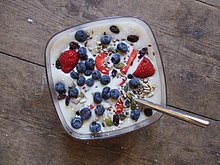Healthy eating habits/Energy for Busy People
This page describes why energy is important for our bodies and where good sources of energy come from. It is aimed at busy people who struggle to find time to eat breakfast and healthy snacks. The page also provides examples of some healthy breakfast and snack foods to try.
Background Info: Energy for Your Body
[edit | edit source]
Our bodies need energy for the performance of all body functions and to support physical activity. Energy gives the body’s cells what they need to be able to move, function, grow, and develop. The body converts chemical energy from food into mechanical, heat, or electrical energy. Anything from the movement of an eyelid blinking, to the stomach digesting food, to running a marathon will need energy.
Energy comes from our food and is measured in the form of kilojoules (kJs). The average estimated energy requirement is 8700kJ, however varies between individuals depending on height, weight, age, gender, and amount of physical activity.
When we have supplied our bodies with the right amount of energy, they perform the best they can. This means that our muscles have what they need to move and our brain and organs can function. Without the brain functioning properly, it is easy to become tired and drained, and unable to perform as best as possible.
If we don’t use all the energy that we consume, the body will use it as storage compounds and it will result in weight gain.

Breakfast for Energy
[edit | edit source]Breakfast is the most important meal of the day. It breaks the fasting state that out body goes into overnight. After a few hours of waking up, all of the stored glucose (from carbohydrate) has been used, this means that the brain doesn’t have anything to continue powering it.
Reasons why eating a healthy breakfast is the best start to the day:
- Helps us feel energised and alert
- Increases our ability to concentrate
- Increases performance and endurance
- Prevent fatigue
- Weight control
- Reduces hunger
- Help us avoid foods high in saturated sat and refined sugars
Some Lasting Tips:
- Having a nutritious breakfast will give you a lot more energy than an extra 10 minutes sleep
- Prioritise waking up a few minutes earlier to prepare and eat breakfast
- Eat breakfast within 10 minutes of waking up
- Eat a nutritious breakfast with complex carbohydrates and some protein
What if I can’t afford a healthy breakfast every day?
[edit | edit source]Putting healthy eating as a high priority can increase overall quality of life. There are lots of delicious and healthy foods that cost under $2.50 per serve.
Some examples include:
- Porridge
- Eggs on toast
- Avocado on toast

Snacking for Energy
[edit | edit source]Eating healthy snacks throughout the day can have lots of beneficial effects on your body and energy levels and assist the good effects of having a healthy breakfast. It is best for our bodies to have a consistent source of energy, instead of our eating habits looking a bit like a rollercoaster ride.
Reasons why eating healthy snacks can benefit you:
- Helps maintain energy levels throughout the day
- Maintains concentration levels
- Can provide essential vitamins and minerals
- Reduces hunger
- Reduces cravings for energy-dense foods high in saturated fat and refined sugar
Snacks vary in energy. If you are more physically active, you should consume more energy. However, be careful not to overeat on days when you aren't doing so much activity.
Below are some healthy snack ideas.
Healthy snacks with lower energy (0 – 400kJ)
- Medium apple
- 2½ cups popcorn
- 2 tablespoons sultanas
Healthy snacks with higher energy (401-800kJ)
- Medium banana
- Celery and carrot sticks with hummus
- 3 pieces of dark chocolate
What if I don’t have time to have healthy snacks?
[edit | edit source]Below are just a few ways that you could make healthy snacks more accessible in your daily life: - Keep bulk amounts of snacks in your car and slip them into your bag when you arrive - Prepare snacks the night before and when you leave grab them
Australian Guide to Healthy Eating
[edit | edit source]The Australian Guide to Healthy Eating provides a guide to the types of food and serving sizes to eat every day. It also gives the number of serves of each group to eat throughout the day. The following table has the number serves to be eating each day for an average adult aged 19-50:
| Male | Female | ||
|---|---|---|---|
| Recommended average daily number of serves from each of the Five Food Groups |
Vegetables and legumes | 6 | 5 |
| Fruit | 2 | 2 | |
| Grain foods | 6 | 6 | |
| Lean meats, etc. and alternatives | 3 | 2½ | |
| Dairy and alternatives | 2½ | 2½ | |
| Additional serves for taller or more active men and women |
Additional serves or discretionary choices | 0—3 | 0—2½ |
For more information on the food groups and what a serving size is see Australian Guide Healthy Eating
Last Minute Tips
[edit | edit source]- An average energy intake is around 8700kJ, however varies between individuals depending on height and weight
- You will need to consume more energy if you are more physically active—this includes incidental daily activity such as walking and standing on stage
- Aim to eat 6 smaller meals each day to help prevent feeling tired and hungry
- Consume a variety of foods from each food group of the Australian Guide to Healthy Eating, and try not to under-eat carbohydrate-rich foods
- Enjoying the food you are eating will encourage you to eat them; experiment to find breakfast and snack food you enjoy
Useful Resources
[edit | edit source]Healthy Breakfast:
[edit | edit source]Better Health Channel. (2014). Breakfast. Retrieved from
http://www.betterhealth.vic.gov.au/bhcv2/bhcarticles.nsf/pages/Breakfast
Better Health Channel. (2014). Breakfast Recipes. Retrieved from
http://www.betterhealth.vic.gov.au/bhcv2/bhcrecipes.nsf/bycategory?open&restricttocategory=breakfast&count=300
Healthy Snacking:
[edit | edit source]Better Health Channel. (2014). 10 Tips for Healthy Snacking. Retrieved from
http://www.betterhealth.vic.gov.au/bhcv2/bhcarticles.nsf/pages/10_tips_for_healthy_snacking
Better Health Channel. (2014). Snack Recipes. Retrieved from
http://www.betterhealth.vic.gov.au/bhcv2/bhcrecipes.nsf/bycategory?open&restricttocategory=snack&count=300
Australian Guide to healthy eating:
[edit | edit source]National Health and Medical Research Council. (2013). Australian Dietary Guidelines. Retrieved from
https://www.nhmrc.gov.au/guidelines/publications/n55
See the ‘Summary’ for a quick overview
Other Resources:
[edit | edit source]Eat Right. (2014). Handouts and Tipsheets. Retrieved from
http://www.eatright.org/nnm/handoutsandtipsheets/#.VBJDJPmSz1Y
Better Health Channel. (2011). Food and Nutrition. Retrieved from
http://www.betterhealth.vic.gov.au/bhcv2/bhcarticles.nsf/pages/hl_foodnutrition?open
Scroll through the list of articles and pages for more information on healthy eating, or search for a specific topic
